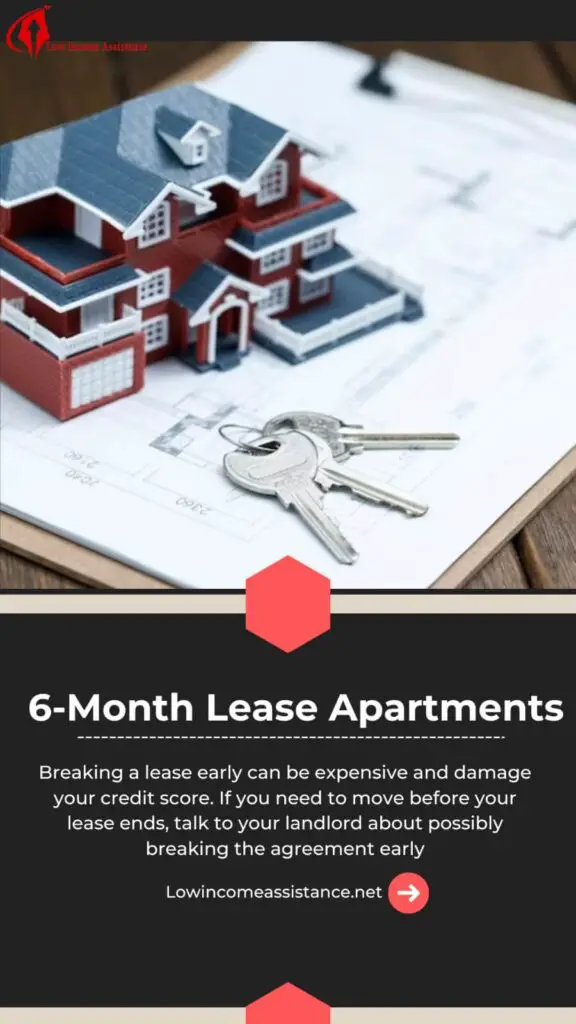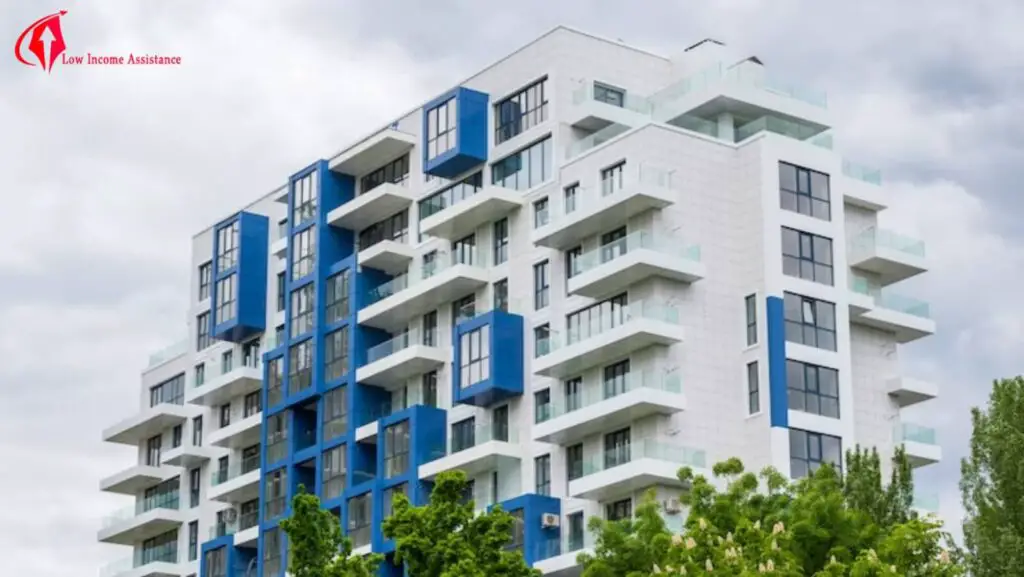Are you considering a 6-month apartment lease but don’t know where to start? Knowing how to begin is hard, with many questions about costs, rental challenges, etc.
Thankfully, this article will answer all your queries on the 6-month lease agreements and provide an overview of the advantages and disadvantages. Read on for everything you need to know!
6-Month Lease Apartments
Six-month leases often have higher rents than longer leases, such as 12-month leases, because landlords know that tenants are only committed for a short period. However, six-month leases still offer tenants stability and predictability in monthly housing costs.

If you’re considering signing a six-month lease, keep a few things in mind. First, be sure to read the entire lease agreement carefully before signing. Pay close attention to any special conditions or rules that may apply to your rental unit or building.
Second, remember that you will likely have to pay rent every month, even if you don’t live in the unit for the full month. For example, if you move out after five months, you will still be responsible for paying rent for that sixth month.
Finally, breaking a lease early can be expensive and damage your credit score. If you need to move before your lease ends, talk to your landlord about possibly breaking the agreement early.
For All Other Types of Grants- Visit Low Income Assistance
Leasing an apartment for six months has its pros and cons. Here are some things to consider before signing a six-month lease agreement.
Advantages Of A 6 Month Lease Apartment
-
You May Get A Lower Rate
In some markets, landlords offer a lower rate for tenants who sign a six-month lease agreement. This can be especially beneficial if you want to save money on rent.
-
You Have More Flexibility
A six-month lease agreement may give you more flexibility than a 12-month agreement. For example, if you need to move for work or personal reasons, you can do so without breaking your lease.
-
You May Get Perks
Some landlords offer tenants perks for signing a six-month lease agreement. Perks may include free or reduced rent for the first month or a security deposit waiver.
Free Apartments for Single Mothers
Disadvantages Of A 6 Month Lease Apartment
-
You May Pay More In The Long Run
In some cases, tenants who sign a six-month lease agreement end up paying more in rent over time than those who sign a 12-month agreement. This is because landlords often raise rents at the end of a lease period, so you may pay more if you renew your lease for another six months.
-
You Have Less Stability
A six-month lease agreement offers less stability than a 12-month agreement. This means that if you need to move, you’ll have to start your search for a new apartment sooner than if you had signed a longer lease.
-
You May Not Be Eligible For Certain Perks
Perks such as discounts on rent or waived security deposits are usually offered to tenants who sign a 12-month agreement, so you may miss out on these if you choose to sign a six-month lease instead.
Costs: Rental Rates, Security Deposits, Fees
The cost of renting an apartment on a month-to-month basis can be significantly higher than signing a standard lease. In addition to shelling out extra cash for not being locked into a long-term agreement, renters who opt for month-to-month leases also typically have to pay higher security deposits and fees.
Before signing any lease, ask your potential landlord about all associated costs so there are no surprises.
-
Rental Rates
Month-to-month leases typically come with a 10% rent premium compared to standard leases. If you’re looking at an apartment that rents for $1,000/month on a standard lease, you can expect to pay $1,100/month on a month-to-month basis.
-
Security Deposits
In addition to paying the first and last month’s rent upfront, tenants who sign month-to-month leases also often have to fork over a larger security deposit – typically equal to one or two months’ rent.
If you’re looking at an apartment requiring a $500 security deposit on a standard lease, you can expect to pay $1,000-$2,000 monthly.
-
Fees
Many landlords charge additional fees for tenants who sign month-to-month leases. These fees can range from pet and utility charges to administration charges and late payment penalty fees. Be sure to ask about all associated costs before signing a month-to-month lease so you can plan accordingly.
Challenges With Renting A 6 Month Lease Property
There are a few challenges that you may face when renting a 6-month lease property. The first challenge is finding a property available for a 6-month lease. Many landlords prefer to sign 12-month leases, so it may be difficult to find a property available for a shorter lease.
Another challenge is the cost of rent. Renting a 6-month lease may be more expensive than renting a 12-month lease because landlords typically charge more for shorter leases.
Finally, you may have to move again at the end of your 6-month lease. This can be challenging if you have settled into your current home and do not want to move again.
Alternatives To 6-Month Leases
If you’re looking for an alternative to a 6-month lease, a few options are available. You could sign a 12-month lease or a shorter-term lease. Each option has pros and cons, so it’s important to weigh your options before making a decision.
-
12-Month Leases
The biggest pro of signing a 12-month lease is that it locks in your rent price for the entire year. This can be helpful if you’re worried about rent prices going up in the future. It can also make budgeting for your housing costs easier since you’ll know exactly how much you’ll pay each month.
However, there are a few downsides to signing a 12-month lease. First, you’re committed to living in one place for a year. If you need to move for any reason (a job change, relationship change, etc.), it can be difficult to break your lease without incurring some penalties.
Additionally, most 12-month leases require you to pay your rent in full upfront, which can be tough if you don’t have the money saved up.
-
Short-Term Leases
Short-term leases (leases that last less than 6 months) are becoming more popular as people increasingly value flexibility in their housing situation. With a short-term lease, you’re not tied down to one place for an extended period, so it’s easy to pick up and move if necessary. They can be more expensive since landlords charge higher rents for short-term leases.
Short-term leases are perfect for those who need a place to stay for a few months but aren’t sure exactly how long they’ll need it. It can also be helpful if you’re waiting for an apartment lease or a mortgage to go through so that you don’t end up stuck without a place to live.
Tips For Finding The Right Apartment On A 6 Month Lease
When it comes to leases, there is no one-size-fits-all answer. The type of lease that makes the most sense for you depends on your circumstances.
If you’re looking for an apartment on a 6-month lease, here are a few tips to help you find the right place:-
- Start Your Search Early:- The earlier you start looking for an apartment, the better your chances of finding a good deal on a 6-month lease.
- Don’t Be Afraid To Negotiate:- If you find an apartment you like, but the landlord only offers a 12-month lease, try negotiating for a 6-month lease instead.
- Know Your Budget:- It’s important to clearly understand how much you can afford to spend on rent each month before you start your search. This will help you narrow your options and avoid wasting time looking at apartments out of your price range.
- Consider All Your Options:- Don’t limit yourself to traditional apartment complexes when finding an apartment on a 6-month lease. Many other options are available, such as subletting from someone already renting an apartment or renting a room in someone’s house.
- Be Prepared To Move Quickly:- Once you find an apartment that meets your needs and budget, be prepared to move quickly if necessary. Often, the best deals on 6-month leases are snapped up quickly by other renters looking for a shorter-term lease.
These tips will help you find the perfect apartment on a 6-month lease. Good luck, and happy hunting!
Conclusion:-
As more people start to consider 6-month leases, it is important to understand the associated costs and challenges. With the information provided in this article, you can now decide whether a lease agreement of this length is right for you.
Consider your needs carefully and research local rental market prices before committing yourself, but if all works out, a 6-month lease may be just right for your next home!
Frequently Asked Questions
What is the cheapest month to lease an apartment?
The cheapest time to lease an apartment is typically during winter. While demand is lower during this time of year, landlords may be more willing to negotiate on price to fill units.
How long is the shortest apartment lease?
Shorter leases (3-6 months) are often more expensive than longer leases (12 months or more). This is because landlords are looking to recoup the costs of turnover and marketing associated with shorter terms.
What is the best lease length for an apartment?
If you’re flexible, the best lease length for an apartment is typically 12 months. This gives you the most stability and often comes with the best rate. However, if you know you’ll only need an apartment for a shorter period, it’s still possible to find good deals on 6 or 9-month leases. Remember that most leases will require you to give notice 30-60 days before your lease expires if you plan on renewing for another term.
What happens when my 6-month tenancy agreement ends?
Finally, if your tenancy agreement ends and you don’t plan on renewing your lease, check your state’s law regarding maximum rental periods. In some states, tenants may be automatically renewed for another term (usually 6 or 12 months) unless they give notice before a certain date informing the landlord.








